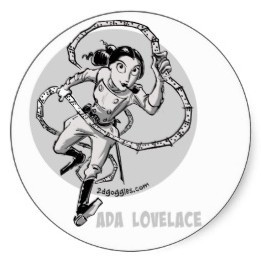
Today is Ada Lovelace Day, named after “the godmother of computer programming” and created to celebrate “the achievements of women in science, technology, engineering and maths.” Among many other activities to mark the day, the founders ask people to “Pick a woman (or women) in STEM whose achievements you admire” and blog/podcast/etc. about them. As I’m quite new to learning about the ed tech field, it got me wondering if there were any prominent women I should know.
I quickly discovered that Janet Clary’s 2009 blog post, “Role Models in Educational Technology on Ada Lovelace Day,” had pretty much covered that, with information about 113 (!!!) women in ed tech. And of course there’s EdTechWomen, a networking community. (my coworker, classmate and I are meeting tomorrow to discuss starting up a local chapter!)
Then I thought about whether I had come across any women working in global ed tech since starting this blog last month, and I remembered noticing that the director of Ubongo in Tanzania was a woman. Ubongo was one of the first ed tech companies I came across in my worldwide search, and I loved their plans for an animated TV series in Kiswahili (includinga rapping giraffe) to teach math skills to children.
Ubongo is a “Tanzanian social enterprise that creates engaging and locally relevant educational content for learners in Africa.” Their managing director is Nisha Ligon, a Thai-American media producer and instructional designer based in Dar es Salaam. She previously worked for The Virtual School in the UK, which “aims to democratise access to the best education for everyone, free of charge.” With a B.S. in Biology from Yale (research paper), an M.S. in Science Media Production from Imperial College London, coding skills (HTML, CSS, Javascript and PHP) and an award-winning documentary film under her belt, she represents not only STEM, but STEAM! 🙂 (just check out her fantastic video CV!)
Nisha’s blending of arts and tech is especially appropriate, as Ada referred to herself as a “poetical scientist” and wrote that “the Analytical Engine weaves algebraical patterns just as the Jacquard-loom weaves flowers and leaves.” She also saw beyond the Analytical Engine’s proposed purpose for crunching numbers, and suggested that it also “might compose elaborate and scientific pieces of music of any degree of complexity or extent.” (from Ada’s notes on Menabrea’s “Sketch of the Analytical Engine”)
Although she’s only a few years into her career journey, I can’t wait to see more from Nisha in the global ed tech field!
Those interested in women and ed tech around the world should also definitely check out Ronda Zelezny-Green, who writes about “gender and the use of mobile phones for learning and other development purposes.” As a PhD student and GSMA’s “mEducation Knowledge Manager & Regional Lead for Asia,” she has her finger on the pulse of issues affecting women’s education and access to technology in developing countries.








